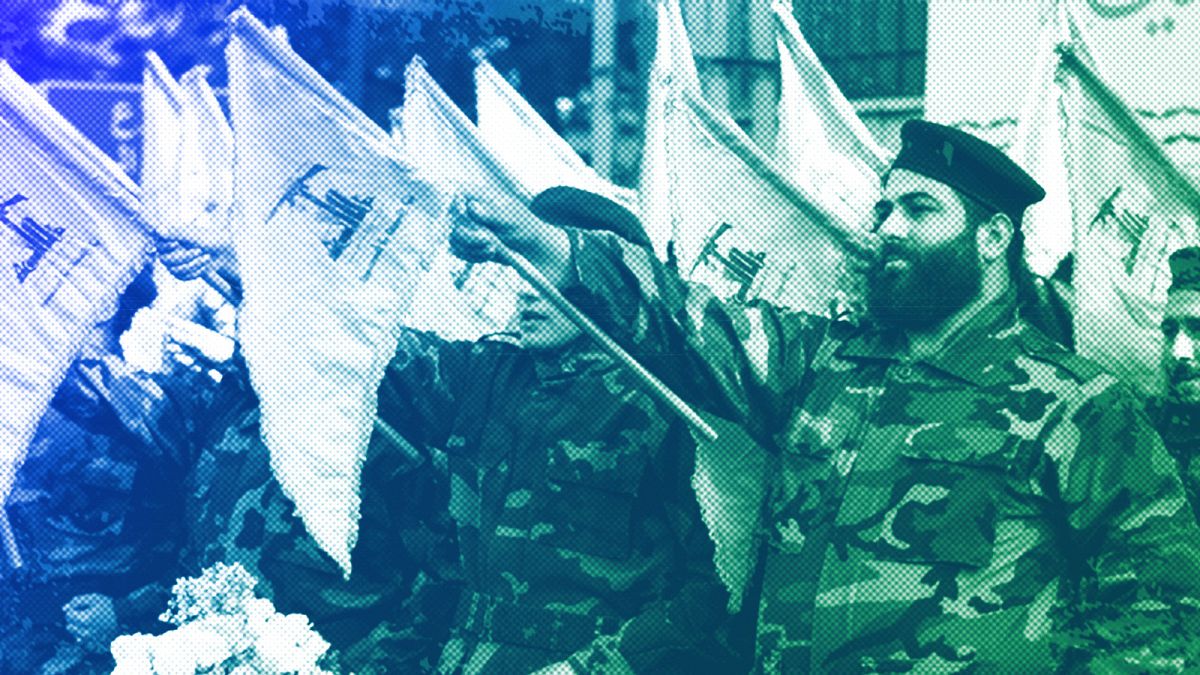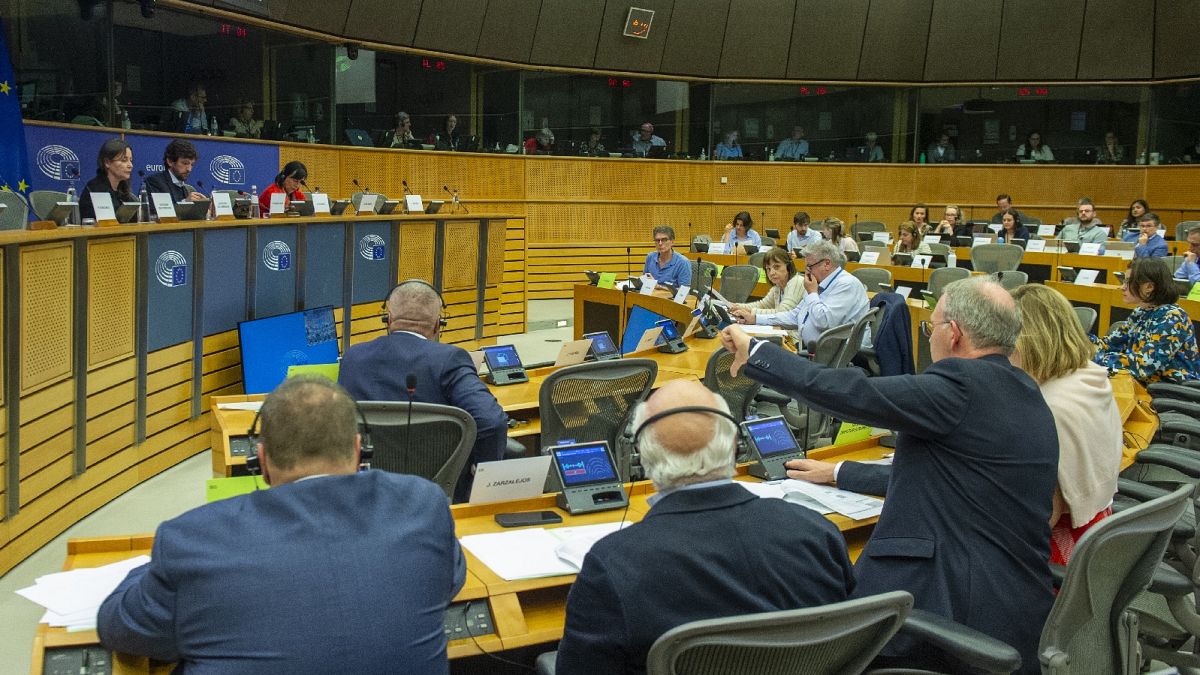Can Lebanon finally free itself from Hezbollah’s grip?

By Brent Sadler, former Middle East Correspondent, ITN, former Beirut Bureau Chief, CNN
The opinions expressed in this article are those of the author and do not represent in any way the editorial position of Euronews.
The renewed war on Lebanon’s well-trodden battlefront could escalate far beyond what we are witnessing now. Yet, even one decisive blow after another will not bridge the deep ideological chasm and decades of enmity that fuel this conflict, Brent Sadler writes.
If satellites are the new artillery of modern warfare, as articulated in the iconic 1997 James Bond film Tomorrow Never Dies, then Israeli Prime Minister Benjamin Netanyahu delivered a verbal bombshell in a video message broadcast worldwide.
He characterised Hezbollah as a “gang of tyrants and terrorists,” and urged the Lebanese people to set themselves free from the terror group.
“You have an opportunity to save Lebanon before it falls into the abyss of a long war that will lead to destruction and suffering, as we see in Gaza,” declared Netanyahu. “It doesn’t have to be that way.”
While Netanyahu has made similar statements in the past, this moment feels markedly different—and far more toxic.
By urging the Lebanese to break away from Hezbollah, a group better equipped than Lebanon’s armed forces, he risks igniting existing tensions in a nation already grappling with deep-seated sectarian divisions and political instability.
Any grassroots uprising could quickly spiral into violent chaos, drawing various factions into the fray, intensifying long-standing rivalries, and further destabilising the country.
Since the assassination of Hassan Nasrallah nearly two weeks ago, Hezbollah’s leadership has suffered significant losses due to Israeli airstrikes. However, the group is far from rudderless.
Rocket fire continues to rain down on Israel, targeting key locations such as the port city of Haifa, an essential economic gateway for the Jewish state. These ongoing attacks underscore Hezbollah’s resilience and its ability to retaliate despite its leadership crisis.
Hezbollah remains resolute and undefeated
With a wealth of experience — including multiple interviews with Hezbollah’s assassinated leader — I can vividly envision the moment death came for Israel’s most formidable adversary.
In one of the largest airstrikes on an urban centre in recent history, Israel unleashed approximately 80 tonnes of explosives, using munitions meticulously designed to penetrate deep into fortified underground structures.
This unprecedented assault not only marked a significant escalation in the conflict but also underscored the lengths to which Israel would go to neutralise a persistent threat. The scale and precision of the attack were a stark reminder of the evolving nature of warfare in the region.
Reaching the terror chief was always a perilous endeavour, shrouded in extreme secrecy and fraught with tension. The journey resembled an elaborate game of shadows, meticulously crafted to obscure his precise whereabouts.
Journalists, blindfolded and flanked by devoted, obsessively protective gunmen, navigated a labyrinth of twisting alleyways and narrow streets, transported to undisclosed destinations, whether above or below ground.
Once enveloped in darkness, sensory deprivation became a constant companion until the blinding return to daylight, offering those who persevered a fleeting, rare audience with Nasrallah himself.
This hidden world, shrouded in secrecy and fortified beneath the surface, is what Israel is methodically dismantling, piece by piece. Each strike reveals the intricate web of power and fear that Hezbollah has woven, exposing vulnerabilities in a structure that once seemed impenetrable.
The unfolding conflict not only targets the leadership but also aims to disrupt the very foundations of this shadowy realm.
Hezbollah’s creators in Tehran may be planning one final orchestrated display for Nasrallah — the Sayeed, a direct descendant of the Prophet Muhammad. Reports indicate that his body, if it indeed exists, has been temporarily buried, awaiting a grand relocation to Iran.
This move could serve as a potent symbol: despite its current setbacks and losses, Hezbollah remains resolute and undefeated. Such a gesture would not only honour Nasrallah’s legacy but also reinforce the narrative of resistance, rallying supporters and asserting that the group continues unbowed.
If half the country was left shocked, saddened, and enraged by Nasrallah’s demise, the other half harboured little regret. As grief consumed one faction, another seethed with frustration, the inevitable result of a leader whose actions repeatedly pushed the nation to the brink of destruction.
This deep societal divide mirrors the broader fractures within Lebanon — a nation caught between steadfast loyalty to resistance and an urgent longing for peace.
The self-styled ‘Party of God’
Hezbollah’s early years during the 1980s were marked by a brutal and effective campaign of suicide bombings, targeting American and European interests in Lebanon with devastating consequences. These attacks, which inflicted heavy casualties, became a signature tactic.
The violence was relentless, turning Lebanon into a theatre of fear, where death could strike indiscriminately and without warning, whether in embassies, military installations, or civilian areas.
This climate of pervasive turmoil destabilised the region and cemented Hezbollah’s reputation as a formidable and ruthless force.
Evolving in the slums of South Beirut, the self-styled “Party of God” found its footing as Iran seized the moment to advance its long-term ambitions.
This marked the dawn of a new era, with Tehran leveraging Hezbollah to spearhead a regional strategy aimed at extending its power and influence in the region.
At the core of the long-running conflict, however, remains a common goal: the struggle to liberate Palestine and the eradication of the “Zionist entity”.
Of all the Lebanese funerals I attended, none had a more consequential impact on the future of Lebanon than that of the Saudi-backed Sunnite Prime Minister Rafik Hariri. His assassination in 2005 by members of Hezbollah sent shockwaves through the nation.
Yet, the bloodletting was far from over.
Lebanon’s civilian population is on the brink of collapse
A wave of targeted attacks soon followed during a so-called “Arab Spring” as Lebanon suffered more car bombs and the deaths of yet more political figures, many of whom were outspoken advocates for independence from Syrian control and Iran’s growing stranglehold.
The previous time Israeli soldiers entered southern Lebanon was back in 2006, when the terror group successfully resisted a previous ground invasion, leading to a military stalemate.
In that conflict, I witnessed Israel targeting Lebanon’s civilian infrastructure in a failed attempt to sow division between Hezbollah’s supporters and its detractors.
This time, Israel seems to have adjusted its strategy, focusing more narrowly on Hezbollah’s leadership and military capabilities.
Yet, Lebanon’s civilian population is already on the brink of collapse. With more than a million people displaced, the potential for internal strife will be exacerbated even as international aid comes to their rescue.
Since their financial system’s meltdown in 2019, most of the country was plunged into poverty. Lebanon is without an elected president, its power grid is virtually non-existent, the main airport is near closure, and its army stands largely powerless against Israel’s relentless bombardments and air strikes. Like Gaza, the country might soon be cut off from the rest of the world.
Despite over 40 years of sustained efforts, Israel has been unable to decisively weaken Hezbollah’s military capabilities, including its long-range weaponry, or significantly curtail Iran’s growing influence in the region.
Likewise, Hezbollah’s political influence within Lebanon has only deepened over time, despite intermittent conflicts and Israeli military campaigns.
However, Hezbollah’s grip on Lebanon is now facing unprecedented challenges as the country grapples with economic collapse, political paralysis, and growing dissatisfaction from within its own population.
Lebanon’s toughest test yet
The challenge ahead for Lebanon — and for external actors — lies in demonstrating to the Lebanese people that there is an alternative to the terror group. This requires not only addressing immediate governance and security concerns but also offering a vision of stability and progress that doesn’t hinge on Hezbollah’s military or political dominance.
Israel’s ultimate goal is nothing less than Hezbollah’s withdrawal from the border area and, ideally, its disarmament. Achieving this would not only neutralise Hezbollah as a military threat but also strip Iran of its key defensive shield, which currently helps deter Israel from striking Tehran’s nuclear capabilities.
Without Hezbollah’s presence along the border, Iran’s strategic depth in Lebanon would be severely compromised, potentially altering the balance of power in the region.
The renewed war on Lebanon’s well-trodden battlefront could escalate far beyond what we are witnessing now. Yet, even one decisive blow after another will not bridge the deep ideological chasm and decades of enmity that fuel this conflict.
If these implacable foes follow through on their threats, Lebanon faces the grim possibility of more intense bombings, the return of an all-out Israeli invasion, or a drawn-out, protracted war that could drag the country back to the nightmare years of its civil war.
Can Lebanon chart a different course, one that prioritises national interests, sovereignty, and prosperity over the sectarian and geopolitical forces that Hezbollah embodies thanks to their slain leader?
This is Lebanon’s toughest test yet, and it remains unclear who can rise to meet it, either inside or outside the country.
Brent Sadler served as ITN’s Middle East Correspondent and later CNN’s Beirut Bureau Chief for nearly four decades on the frontlines of the Israeli-Lebanese conflict.
At Euronews, we believe all views matter. Contact us at [email protected] to send pitches or submissions and be part of the conversation.
World News || Latest News || U.S. News
Source link



